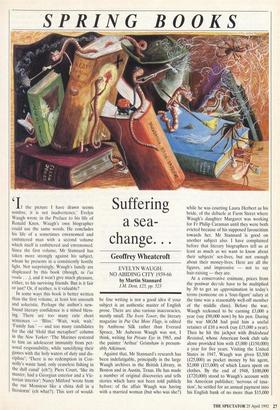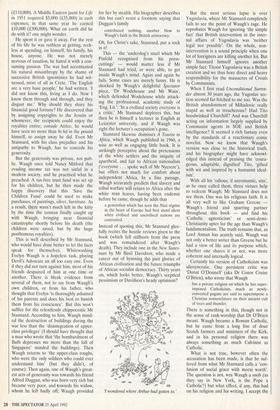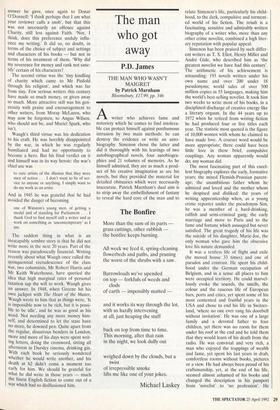SPRING BOOKS
Suffering a sea- change.. .
Geoffrey Wheatcroft
EVELYN WAUGH: NO ABIDING CITY 1939-66 by Martin Stannard J.M. Dent, £25, pp. 523 If the picture I have drawn seems sombre, it is not inadvertence,' Evelyn Waugh wrote in the Preface to his life of Ronald Knox. Waugh's own biographer could use the same words. He concludes his life of a sometimes envenomed and embittered man with a second volume which itself is embittered and envenomed. Since the first volume, Mr Stannard has taken more strongly against his subject, whom he presents in a consistently hostile light. Not surprisingly, Waugh's family are displeased by this book (though, to l'as voulu . . .), and it won't give much pleasure, either, to his surviving friends. But is it fair or just? Or, if neither, is it valuable?
In some ways this book is better written than the first volume, at least less uncouth and solecistic. Perhaps the author's new- found literary confidence is a mixed bless- ing. There are too many cute short sentences — `Bliss."Wait, wait, wait.' `Family fun.' — and too many candidates for the old 'Hold that metaphor!' column in the New Yorker: The Marines restored to him an adolescent immunity from per- sonal responsibility, while sanctifying their games with the holy waters of duty and dis- cipline'; 'There is no redemption in Con- nolly's waste land, only ceaseless fishing in the dull canal' (eh?); Piers Court, 'like its master, had a Georgian exterior and a Vic- torian interior'; Nancy Mitford 'wrote from the rue Monsieur like a china doll in a firestorm' (eh what?). This sort of would- be fine writing is not a good idea if your subject is an authentic master of English prose. There are also various inaccuracies, mostly small. The Ivory Tower, the literary magazine in Put Out More Flags, is edited by Ambrose Silk rather than Everard Spruce, Mr Auberon Waugh was not, I think, writing for Private Eye in 1965, and the painter 'Arthur' Grimshaw is presum- ably Atkinson.
Against that, Mr Stannard's research has been indefatigable, principally in the large Waugh archives in the British Library, in Boston and in Austin, Texas. He has made a number of original discoveries and tells stories which have not been told publicly before: of the affair Waugh was having with a married woman (but who was she?) while he was courting Laura Herbert as his bride, of the debacle at Farm Street where Waugh's daughter Margaret was working for Fr Philip Caraman until they were both evicted because of his supposed favouritism towards her. Mr Stannard 'is good on another subject also. I have complained before that literary biographers tell us at least as much as we want to know about their subjects' sex-lives, but not enough about their money-lives. Here are all the figures, and impressive — not to say hair-raising — they are.
At a conservative estimate, prices from the postwar decade have to be multiplied by 30 to get an approximation in today's terms (someone on a lour-figure' salary at the time was a reasonably well-off member of the middle class). Before the war, Waugh reckoned to be earning £3,000 a year (say £90,000 now) by his pen. During the war MGM had paid him a useful retainer of £10 a week (say £15,000 a year). Then he hit the jackpot with Brideshead Revisited, whose American book club sale alone provided him with £5,000 (£150,000) a year for five years. Visiting the United States in 1947, Waugh was given $3,500 (05,000) as pocket money by his agent, $2,000 (£15,000) of which Laura spent on clothes. By the end of 1948, $100,000 (020,000) stood to Waugh's account with his American publisher; 'nervous of taxa- tion', he settled for an annual payment into his English bank of no more than $15,000
(£110,000). A Middle Eastern jaunt for Life in 1951 required $5,000 (£35,000) in cash expenses; in that same year he earned £10,000 (£300,000). What on earth did he do with it? one might wonder.
He spent it or gave it away. For the rest of his life he was ruthless at getting, reck- less at spending, on himself, his family, his house, anyone. He was not merely nervous of taxation, he hated it with a con- suming passion. The war had accentuated his natural misanthropy by the shame of successive British ignominies he had wit- nessed, most of all in Crete. 'The English are a very base people,' he had written. 'I did not know this, living as I do. Now I know them through and through, and they disgust me.' Why should they share his financial good fortune? He discovered that by assigning copyrights to the Jesuits or whomever, the recipients could enjoy the royalties entire; consule Attlee, he would have seen no more than 4s 6d in the pound himself, so assign away he did. Even Mr Stannard, with his class prejudice and his antipathy to Waugh, has to concede his generosity.
But the generosity was private, not pub- lic. Waugh once told Nancy Mitford that evading income tax was not sinful in a modern society, and he practised what he preached. A tax-free trust fund was set up for his children, but he then made the happy discovery that this 'Save the Children Fund' could be used to make purchases, of paintings, silver, furniture. As a result, there wasn't much left in the kitty by the time the taxman finally caught up with Waugh, bringing near financial catastrophe shortly before his death (the children were saved, but by the huge posthumous royalties).
This is well described by Mr Stannard, who would have done better to let the facts speak for themselves. Whitewashing Evelyn Waugh is a hopeless task, playing Devil's Advocate an all too easy one. Even if they did not turn against him, most of his friends despaired of him at one time or another. There is bleak evidence from several of them, not to say from Waugh's own children, or from his father, who thought that Evelyn 'is thoroughly ashamed of his parents and does his best to banish them from his conscience'. But this won't suffice for the relentlessly chippocratic Mr Stannard. According to him, Waugh mind- ed the destruction of buildings during the war less than the 'disintegration of upper- class privileges' (I should have thought that a man who wrote that 'the bombardment of Bath depresses me more than the fall of Singapore' minded the buildings). Then Waugh returns to 'the upper-class toughs, who were the only soldiers who could ever understand him' (but they didn't, of course). Then again, one of Waugh's great- est acts of generosity was towards his friend Alfred Duggan, who was born very rich but became very poor, and towards his widow, whom he left badly off; Waugh provided for her by stealth. His biographer describes this but can't resist a footnote saying that Duggan's family
contributed nothing, another blow to Waugh's faith in the British aristocracy.
Oh, for Christ's sake, Stannard, put a sock in it!
This — the 'underdog's snarl which Mr Pinfold recognised from his press- cuttings' — would matter less if Mr Stannard had tried, or were able, to get inside Waugh's mind. Again and again he fails. Some cases are merely funny. He is shocked by Waugh's delightful Spectator piece, 'Dr Wodehouse and Mr Wain', which defended Wodehouse while attack- ing the professional, academic study of 'Eng. Lit.': 'In a civilised society everyone is a critic.' Mr Stannard deplores this, but then he is himself a lecturer in English at Leicester university, and if Waugh was right the lecturer's occupation's gone.
Stannard likewise dismisses A Tourist in Africa, which Waugh published in 1960, a wise as well as engaging little book. It is strikingly perceptive about the pretensions of the white settlers and the iniquity of apartheid, and fair to African nationalists ('everyone . . . spoke well of Mr Nyerere'), but offers not much for comfort about independent Africa. In a fine passage, Waugh accurately predicts that slavery and tribal warfare will return to Africa after the white man leaves, having been endemic before he came, though he adds that
a generation which has seen the Nazi regime in the heart of Europe had best stand silent when civilised and uncivilised nations arc contrasted.
Instead of quoting this, Mr Stannard glee- fully recites the hostile reviews given to the book (which fell stillborn from the press and was remaindered after Waugh's death). They include one in the New States- man by Mr Basil Davidson, who made a career out of hymning the past glories of African civilisation and the future triumphs of African socialist democracy. Thirty years on, which looks better, Waugh's sceptical pessimism or Davidson's heady optimism?
'1 wondered where Arthur had gotten to.' But the most serious lapse is over Yugoslavia, where Mr Stannard completely fails to see the point of Waugh's rage. He reprobates Waugh for ignoring 'the simple fact' that British intervention in the inter- nal affairs of Yugoslavia was 'neither legal nor possible'. On the whole, non- intervention is a sound principle when one lot of foreigners are killing another lot. But Mr Stannard himself ignores another simple fact: Titoist Yugoslavia was a British creation and we thus bore direct and heavy responsibility for the massacres of Croats by Communists.
When I first read Unconditional Surren- der almost 30 years ago, the Yugoslav sec- tion seemed far-fetched to me too. Was the British abandonment of Mihailovic really stupid as well as treacherous? Had Tito hoodwinked Churchill? And was Churchill acting on information largely supplied by Communist agents in SOE and British intelligence? It seemed a rich fantasy even by the standards of a reactionary comic novelist. Now we know that Waugh's version was close to the historical truth, and his biographer might have acknowl- edged this instead of praising the 'coura- geous, adaptable, dignified' Tito, 'gifted with wit and inspired by a humanist ideal- ism'.
With all his 'odious, if unromantic, sins', as he once called them, three virtues help to redeem Waugh; Mr Stannard does not see them. One was his religious faith. It is all very well to like Graham Greene Waugh's friend and sparring partner throughout this book — and find his 'Catholic agnosticism' or semi-demi- Christianity apter for the age than Waugh's fundamentalism. The truth remains that, as Lord Annan has acutely said, Waugh was not only a better writer than Greene but he had a view of life and its purpose which, whether one shares it or not, was more coherent and internally logical.
Certainly his version of Catholicism was idiosyncratic. One persistent critic was 'Donat O'Donnell' (aka Dr Conor Cruise O'Brien), who wrote that Waugh
has a private religion on which he has super- imposed Catholicism, much as newly- converted pagans are said to superimpose a Christian nomenclature on their ancient cult of trees and thunder.
There is something in this, though not in the sense of rank-worship that Dr O'Brien meant. Waugh became a Roman Catholic, but he came from a long line of dour Scotch farmers and ministers of the Kirk, and in his personal religion there was always something as much Calvinist as Catholic.
What is not true, however often the accusation has been made, is that he suf- fered from what Mr Stannard calls a 'con- fusion of social grace with moral worth'. The question is not, was Waugh a snob (as they say in New York, is the Pope a Catholic?) but what effect, if any, this had on his religion and his writing. I accept the answer he gave, once again to Donat O'Donnell: 'I think perhaps that I am what your reviewer calls a snob', but that this was not necessarily an offence against Charity, still less against Faith. 'Nor, I think, does this preference unduly influ- ence my writing.' It did so, no doubt, in terms of the choice of subject and settings and characters of his books — but not in terms of his treatment of them. 'Why did my reverence for money and rank not sanc- tify' certain of his characters?
The second virtue was the 'tiny kindling of charity which came to Mr Pinfold through his religion', and which was far from tiny. Few serious writers this century have made so much money, or given away so much. More attractive still was his gen- erosity with praise and encouragement to other writers, from Moray McLaren, who may now be forgotten, to Angus Wilson, who should not be, and Muriel Spark, who isn't.
Waugh's third virtue was his dedication to his craft. He was horribly disappointed by the war, in which he was regularly humiliated and had no opportunity to become a hero. But his final verdict on it and himself was in its way heroic: the war's chief use was
to cure artists of the illusion that they were men of action . . . I don't want to he of ser- vice to anyone or anything. I simply want to do my work as an artist.
And in 1945 he was grateful that he had avoided the danger of becoming
one of Winston's young men, of getting a medal and of standing for Parliament . . . 1 thank God to find myself still a writer and at work on something as 'uncontemporary' as I am.
The saddest thing in what is an inescapably sombre story is that he did not write more in the next 20 years. Part of the reason was paradoxically financial. Writing recently about what Waugh once called the quinquennial recrudescence of the class war, two columnists, Mr Robert Harris and Mr Keith Waterhouse, have queried the idea that high marginal rates of personal taxation sap the will to work. Waugh gives an answer. In 1948, when Greene hit his own jackpot with 7he Heart of the Matter, Waugh wrote to him that as things were, 'It is impossible now to be rich, but it is possi- ble to be idle', and he was as good as his word. Not needing any more money him- self, and determined to let the state have no more, he downed pen. Quite apart from the regular, disastrous benders in London, more and more of his days were spent writ- ing letters, doing the crossword, sitting all afternoon in Dursley cinema, drinking gin. With each book he seriously wondered whether he would write another, and his death at 62 didn't come a moment too early for him. We should be grateful for what he did write in those years — much the finest English fiction to come out of a war which had so disillusioned him.




























































 Previous page
Previous page